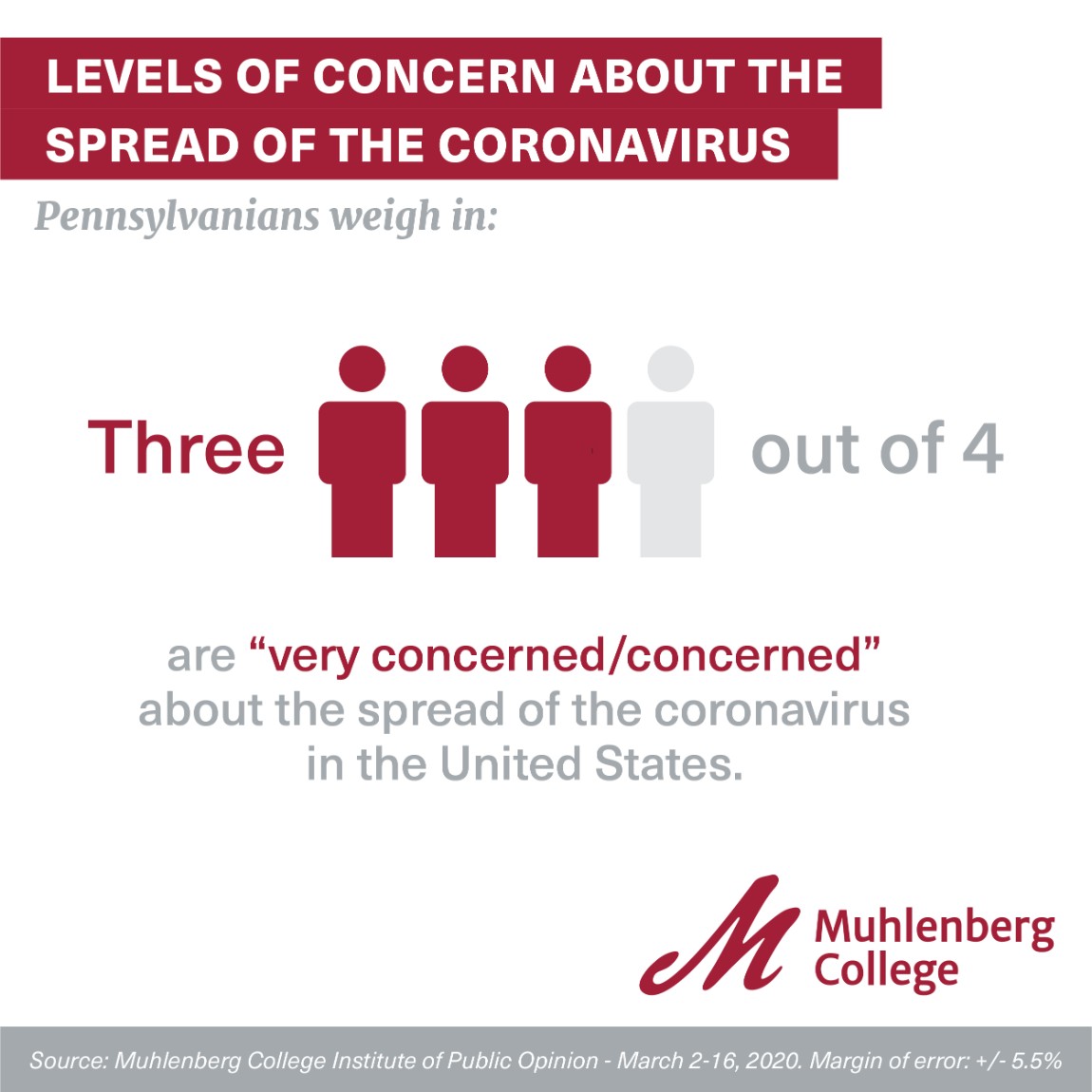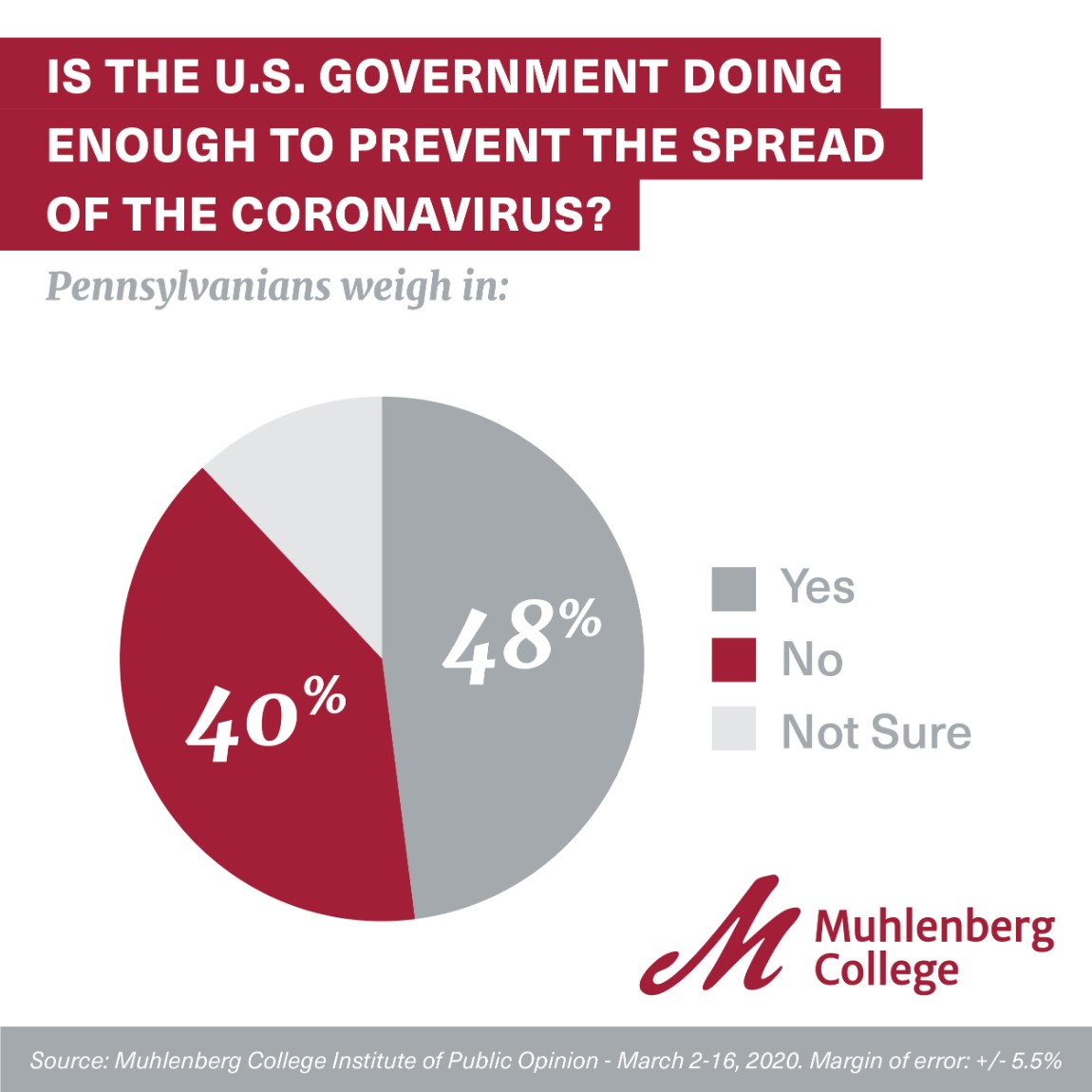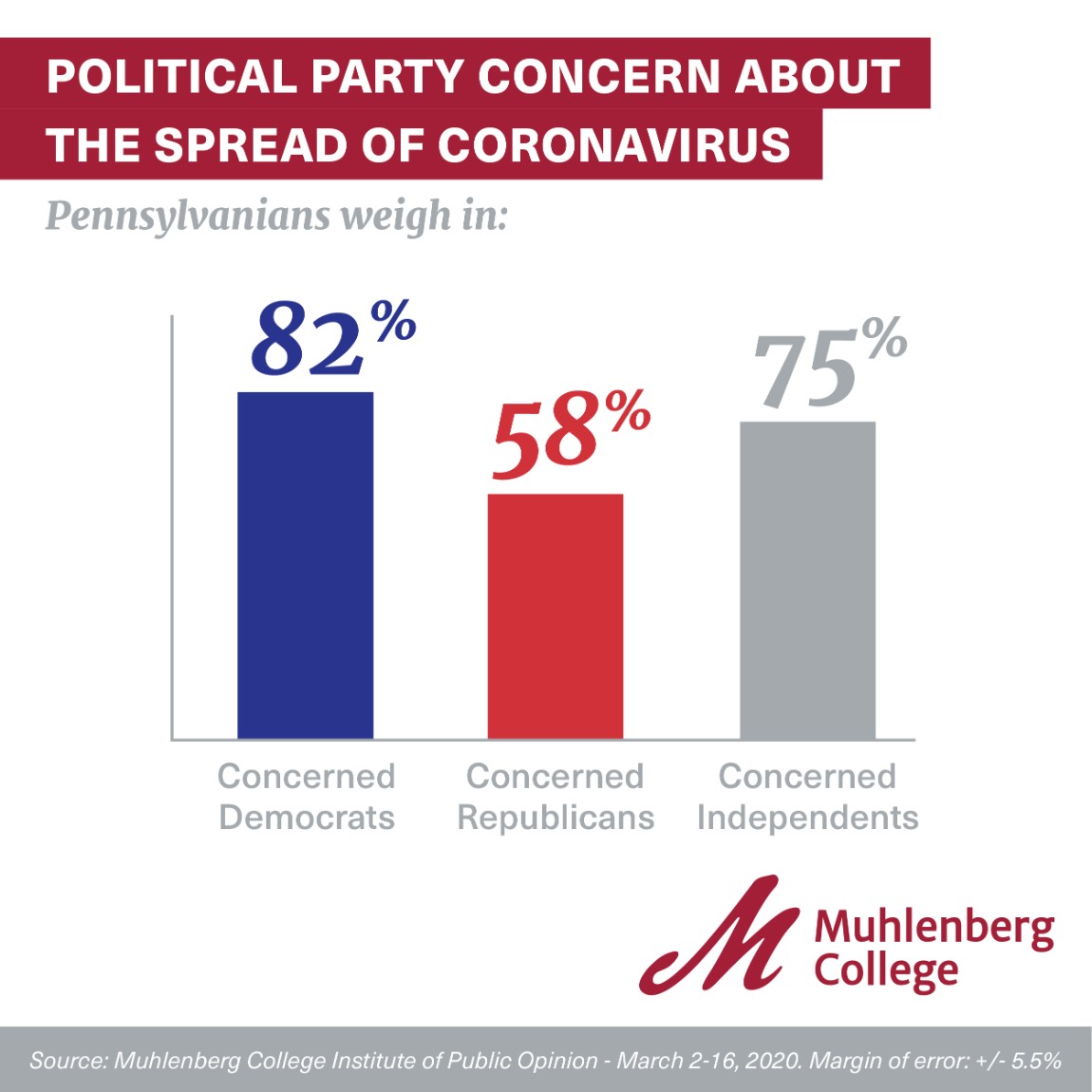Muhlenberg College Public Health Program: 2020 Pennsylvania Public Health Poll—Coronavirus Report
The following report (Muhlenberg 2020 Pennsylvania Public Health Poll - Covid-19 Report, PDF) provides findings regarding the perceptions of Pennsylvanians about the coronavirus outbreak. The findings are drawn from the annual Muhlenberg College Public Health Program Survey of Pennsylvanians on public health issues. The full results of the survey will be released in upcoming weeks, but given the timeliness of the questions regarding the coronavirus, this breakout report is being released earlier.
The survey marks the 8th year of this initiative that is a partnership between the Muhlenberg College Institute of Public Opinion (MCIPO) and the Muhlenberg College Public Health Program.
Full methodological details for the survey are included below in the methodological statement, but it is important to note that the survey was in the field between March 2 and March 16. During this period both Pennsylvania and the United States declared states of emergency. We have decided to provide the results from the survey both in the aggregate form and in divided form between early and late stages of fielding. The sample sizes by the periods of fielding are considerably smaller than for the entire sample, and thus have larger margins of error for the estimates.
Key Findings
- Among Pennsylvania adults, 3 out of 4 (74%) reported that they were either “very concerned” or “concerned” about the spread of the coronavirus in the United States during the period of March 2–16, 2020.

- The percent of Pennsylvanians “very concerned” or “concerned” about the spread of the coronavirus increased from 67% between March 2–10, to 81% during the period of March 11–16.
- Pennsylvanians are divided on the work of the U.S. government in preventing the spread of the coronavirus, with 48% indicating the government is doing enough on this issue and 40% stating the government is not doing enough.

- There was an 8% increase (45%–53%) among Pennsylvanians who think the U.S. government is doing enough to prevent the spread of the coronavirus between the early stages of fielding (March 2–10) and later stages (March 11–16).
- Concern with the spread of the coronavirus is higher among Pennsylvania women in comparison with men in the state. While 81% of women indicated they were either “very concerned” or “concerned” about the spread of coronavirus, only 64% of men did so.
- Democrats were significantly more likely than Republicans to report concerns with the spread of the coronavirus, with 82% of Pennsylvanian Democrats indicating concern about this issue compared to 58% of Republicans. In addition, 75% of politically independent Pennsylvanians expressed concern about the spread of coronavirus.

- There are significant differences in levels of concern regarding coronavirus among Pennsylvanians across age groups, with 20% of state residents between the ages of 18 and 29 “very concerned” about the spread of the virus, compared to 48% of Keystone State residents 65 and older.
Muhlenberg 2020 Pennsylvania Public Health Poll - Covid-19 Report (Full Report/PDF)
Methodological Statement
The following report contains the results of a telephone survey of 420 adults in the Commonwealth of Pennsylvania between March 2–16, 2020. Respondents were interviewed in English on both landlines (83) and cell phones (337). With a randomly selected sample of respondents, the margin of error for the surveys is +/- 5.5% at a 95% level of confidence. Margins of error for questions with smaller sample size will be larger. In addition to sampling error, one should consider that question wording and other fielding issues could introduce error or bias into survey results. The sample data has been weighted by gender, race, age, income and educational attainment to reflect those Pennsylvania population characteristics as reported by the United States Census Bureau in 2019. The calculation of sampling error takes into account design effects due to the weighting identified above. In order to reach a representative sample of adult Pennsylvanians, both landlines and cell phones are called up to 5 times. The response rate for this survey as calculated using the American Association of Public Opinion Research (AAPOR) RRII formula is approximately 8%. Due to rounding, the totals provided in the frequency report may not total 100%. The survey instrument was designed by Christopher P. Borick, Director of the Muhlenberg College Institute of Public Opinion (MCIPO) and Professor in the Public Health Program, in conjunction with students in the Public Health Program at Muhlenberg College. The survey was funded exclusively by Muhlenberg College. For more detailed information on the methods employed, please contact the MCIPO at 484-664-3444 or email [email protected].
FREQUENCY REPORT AND QUESTION WORDING
NOTE: The questions were numbered 24 and 25 in the full 2020 Public Health Survey, which will be released in its entirety in a subsequent report.
QUESTION 24: Next I have a few questions about the coronavirus. Are you very concerned, concerned, not very concerned, or not concerned at all about the spread of coronavirus in the U.S.?
- Very Concerned……………………………….36%
- Concerned……………………………………..38%
- Not Very Concerned…………………………..15%
- Not Concerned at All………………………….10%
- Not Sure………………………………………. 2%
QUESTION 25: Do you think U.S. Government officials are doing enough or not enough to prevent the spread of coronavirus in the U.S.?
- Enough……………………………………….. 48%
- Not Enough…………………………………… 40%
- Not sure……………………………………….. 12%
LEVELS OF CONCERN ABOUT THE SPREAD OF THE CORONAVIRUS AMONG PENNSLVANIANS
Comparison of Periods of Interviews
MARCH 2–11 vs. March 11–16
|
March 2–10 |
March 11–16 |
Change |
|
|
Very Concerned |
31% |
42% |
+11% |
|
Concerned |
35% |
39% |
+4% |
|
Not Very Concerned |
17% |
12% |
-5% |
|
Not Concerned at All |
14% |
6% |
-8% |
|
Not Sure |
3% |
2% |
-1% |
VIEWS ON THE EFFORTS OF THE U.S. GOVERNMENT TO PREVENT THE SPREAD OF CORONAVIRUS AMONG PENNSLVANIANS
Comparison of Periods of Interviews
MARCH 2–11 vs. March 11–16
|
March 2–10 |
March 11–16 |
Change |
|
|
Enough |
45% |
53% |
+8% |
|
Not Enough |
40% |
37% |
-3% |
|
Not Sure |
15% |
9% |
-6% |
LEVELS OF CONCERN ABOUT THE SPREAD OF THE CORONAVIRUS
SELECTED CROSSTABS
|
Very Concerned |
Somewhat Concerned |
Not Very Concerned |
Not Concerned at All |
Not Sure |
|
|
OVERALL |
38% |
36% |
15% |
10% |
2% |
|
Male (49%) |
29% |
35% |
16% |
16% |
4% |
|
Female (51%) |
41% |
40% |
13% |
5% |
1% |
|
Democrat (40%) |
47% |
35% |
10% |
7% |
1% |
|
Republican (34%) |
22% |
36% |
23% |
15% |
4% |
|
Independent (14%) |
33% |
42% |
14% |
7% |
4% |
|
College Degree (38%) |
37% |
37% |
16% |
9% |
1% |
|
No College Degree (62%) |
35% |
37% |
14% |
11% |
3% |
|
White (74%) |
32% |
39% |
16% |
12% |
2% |
|
Non-White (26%) |
45% |
30% |
12% |
7% |
5% |
|
18-29 (22%) |
20% |
44% |
19% |
18% |
0% |
|
30-49 (30%) |
31% |
38% |
16% |
10% |
5% |
|
50-64 (26%) |
43% |
28% |
17% |
7% |
4% |
|
65 and Over (23%) |
48% |
38% |
6% |
7% |
1% |
VIEWS ON THE EFFORTS OF THE U.S. GOVERNMENT TO PREVENT THE SPREAD OF THE CORONAVIRUS AMONG PENNSLVANIANS
SELECTED CROSSTABS
|
Doing Enough |
Not Doing Enough |
Not Sure |
|
|
OVERALL |
48% |
40% |
12% |
|
Male (49%) |
50% |
35% |
15% |
|
Female (51%) |
48% |
43% |
10% |
|
Democrat (40%) |
28% |
62% |
11% |
|
Republican (34%) |
78% |
14% |
8% |
|
Independent (14%) |
36% |
41% |
22% |
|
College Degree (38%) |
44% |
34% |
15% |
|
No College Degree (62%) |
51% |
46% |
9% |
|
White (74%) |
54% |
36% |
10% |
|
Non-White (26%) |
33% |
47% |
20% |
|
18-29 (22%) |
52% |
32% |
16% |
|
30-49 (30%) |
44% |
44% |
16% |
|
50-64 (26%) |
44% |
40% |
7% |
|
65 and Over (23%) |
57% |
39% |
13% |
